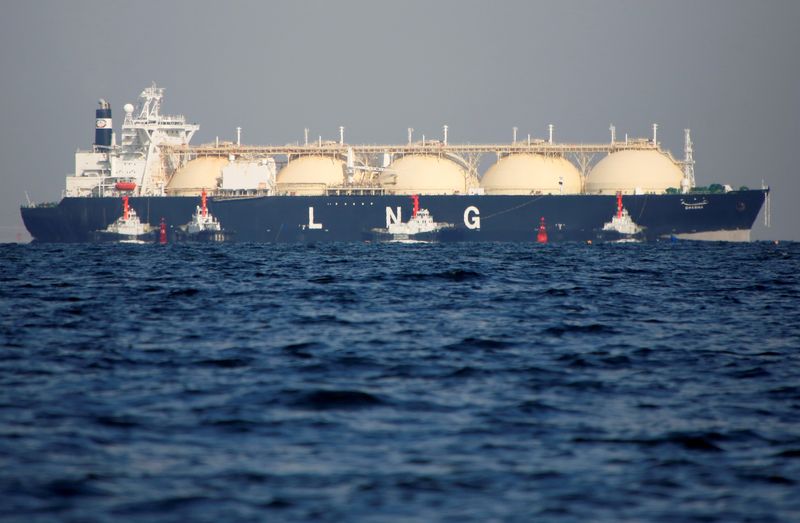By Katya Golubkova, Yuka Obayashi and Kate Abnett
TOKYO (Reuters) - Japan's energy companies were quick to embrace the G7's support for natural gas investment in their statement last month but analysts caution that relying on the fossil fuel may open the companies up to long-term problems.
Resource poor Japan, the world's biggest buyer of liquefied natural gas (LNG), is committed to gas as a transition fuel to reach its net-zero carbon emission goals while ensuring energy security but that conflicts with the demands from other G7 members to curb all fossil fuel use sooner rather than later.
Japan's insistence on continuing to rely on gas may delay reaching global climate change goals, especially as its energy companies reap large profits from their investments in the sector, climate activists say.
The meeting of G7 climate ministers eventually agreed last month, despite tussles between Japan and European nations, that gas investments "can be appropriate to help address potential market shortfalls" as a result of Russia's invasion of Ukraine and the disruptions it has caused to global energy markets.
On Monday, Takehiro Honjo, the chairman of the Japan Gas Association, said the fact the G7 made it clear that it is appropriate to invest in natural gas mitigates some of investment risk for Japanese companies looking to continue their spending on projects.
But analysts warn that in the long-term Japan's goals to cut out carbon emissions from its energy sector will reduce the value of future gas projects.
"The short lead time of shale gas or LNG export projects as well as the contract flexibility fit well with what major consumers including Japan and Europe are looking for in the era of uncertainty," said Yoko Nobuoka, senior analyst of Japan power research at Refinitiv.
"But I think Japanese companies will generally hesitate to be involved in gas projects in the future, especially those with long lead times. The main reason is the country's long-term decarbonization ambition," she said.
Japan's support for gas clashes with findings that new investments in gas, which is mainly composed of the greenhouse gas methane and produces CO2 emissions when burned for energy, would undermine climate goals.
The International Energy Agency (IEA) has said no new investments in fossil fuel supply can be made if the world is to limit global warming to 1.5 degrees Celsius (2.7 Fahrenheit).
But, gas investments have been lucrative for Japan's energy companies resulting in record profits.
Other G7 nations, including Germany, have also spent money on LNG infrastructure after the Ukraine invasion.
Japan's is also acutely dependent on gas from Russia, the country's third-largest supplier, especially from the Sakhalin Island LNG project.
"IMPORTANT RESOURCE"
Because of that dependency, Japanese energy companies are keen to diversify their gas supply sources to include Australia and the U.S.
Trading house Marubeni Corp believes gas "will be utilised as a very important resource in the future", Chief Executive Officer Masumi Kakinoki said last week.
Tokyo Gas, the Japanese capital's main gas supplier with assets in LNG and other fossil fuels, also hailed the G7 language on gas as it plans to keep investing in gas infrastructure in Asia and U.S. shale gas upstream assets.
Japan's biggest oil refiner Eneos Holdings plans to invest 180 billion yen over the three years in its oil and gas upstream segment, including for the additional development of LNG in Asia.
But, Japan's stated intention to lower its carbon emissions may mean these gas investments carry some risk.
The G7 climate and energy ministers also set big new collective targets for solar power and offshore wind capacity, agreeing to speed up renewable energy, which may eat into gas demand.
The IEA sees global gas consumption reaching a plateau this decade and data from Japan's finance ministry shows that demand in the country is on a downwards trajectory over the past few months.
Gas assets, both upstream and LNG, could start to be seen as stranded already in around 2030, Refinitiv's Nobuoka said.

"New investments in gas not only risk being stranded but will also likely fail to deliver the needed transition", said Maria Pastukhova, senior policy advisor at independent climate think tank E3G.
"There are ample clean energy solutions that can deliver energy access and security faster and in a more sustainable way."